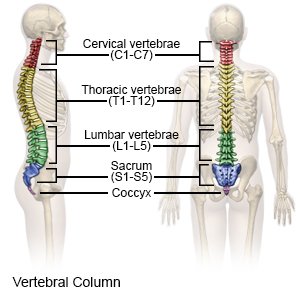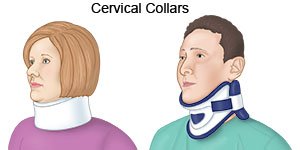Cervical Radiculopathy
Medically reviewed by Drugs.com. Last updated on Aug 4, 2025.
Cervical radiculopathy is a painful condition that happens when a spinal nerve in your neck is pinched or irritated.
 |
DISCHARGE INSTRUCTIONS:
Medicines:
You may need any of the following:
- NSAIDs help decrease swelling and pain. This medicine can be bought without a doctor's order. This medicine can cause stomach bleeding or kidney problems in certain people. If you take blood thinner medicine, always ask your provider if NSAIDs are safe for you. Always read the medicine label and follow the directions on it before using this medicine.
- Prescription pain medicine helps decrease pain. Do not wait until the pain is severe before you take this medicine.
- Steroids help decrease pain and swelling. These may be given as a pill or as an injection in your neck. You may need more than 1 injection if your symptoms do not improve after the first treatment.
- Take your medicine as directed. Contact your healthcare provider if you think your medicine is not helping or if you have side effects. Tell your provider if you are allergic to any medicine. Keep a list of the medicines, vitamins, and herbs you take. Include the amounts, and when and why you take them. Bring the list or the pill bottles to follow-up visits. Carry your medicine list with you in case of an emergency.
Follow up with your healthcare provider or spine specialist as directed:
Write down your questions so you remember to ask them during your visits.
Related medications
Treatment options
The following list of medications are related to or used in the treatment of this condition.
Physical therapy:
Your provider may suggest physical therapy to stretch and strengthen your muscles. Your physical therapist can teach you how to improve your posture and the way you hold your neck. The therapist may also teach you how to be safely active and avoid more injury. The therapist can also help you develop an exercise program that is safe for your back and neck.
Self-care:
- Ice helps decrease swelling and pain. Ice may also help prevent tissue damage. Use an ice pack, or put crushed ice in a plastic bag. Cover it with a towel and place it on your neck for 15 to 20 minutes every hour or as directed.
- Rest when you feel it is needed. Slowly start to do more each day. Return to your daily activities as directed.
- Wear a soft collar. You may be given a soft collar to support your neck while you sleep. Wear the soft collar only as directed.

- Do light stretches and regular exercise. Your provider may suggest light stretches to help decrease stiffness in your neck and arm as you recover. After your pain is controlled, you may benefit from regular exercise. Ask what type of exercise is safe for your back and neck.
- Review your work area. A comfortable work area can help prevent neck strain. Ask your employer for an ergonomic review to check the position of your desk, chair, phone, and computer. Make any necessary adjustments for your comfort.
Contact your healthcare provider or spine specialist if:
- You have a fever.
- You are losing weight without trying.
- Your pain is worse, even with medicine.
- One or both hands feel more numb than before, or you cannot move your fingers well.
- You have questions or concerns about your condition or care.
© Copyright Merative 2025 Information is for End User's use only and may not be sold, redistributed or otherwise used for commercial purposes.
The above information is an educational aid only. It is not intended as medical advice for individual conditions or treatments. Talk to your doctor, nurse or pharmacist before following any medical regimen to see if it is safe and effective for you.
Learn more about Cervical Radiculopathy
Treatment options
Care guides
Further information
Always consult your healthcare provider to ensure the information displayed on this page applies to your personal circumstances.
